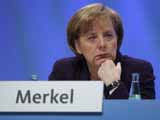|
|
TODAY.AZ / World news
German Chancellor seeks sanctions against Iran
22 March 2010 [11:45] - TODAY.AZ
German Chancellor Angela Merkel says new sanctions are needed against Iran to pressure the country into giving up its nuclear program.
 Speaking to reporters on Monday after talks with Lebanese Prime Minister Saad Hariri, Merkel blamed Iran for the failure to reach an agreement in negotiations so far.
Speaking to reporters on Monday after talks with Lebanese Prime Minister Saad Hariri, Merkel blamed Iran for the failure to reach an agreement in negotiations so far.She said that it was Tehran that had rejected "constructive offers" put forward by the group of six powers negotiating with Tehran.
"We are about to enter the stage where sanctions should be taken against Iran," she added.
The US and its European allies have been trying to use their privileges at the Security Council to push through a fourth round of sanctions against Iran, while China and Russia have been reluctant to go along with the plan.
Although UN nuclear watchdog inspectors stationed in Iran have not been able to back up their claim, the US and its allies allege that Iran intends to develop nuclear weapons under the guise of its civilian program.
That is why they have piled on the pressure against Iran to force the country to suspend uranium enrichment, an activity that it is legally permitted to conduct under International Atomic Energy Agency (IAEA) regulations.
The two sides of the dispute came close to ending the strife in October 2009, when representatives from the Agency, Iran and three of the six powers gathered in Vienna to discuss a nuclear fuel deal, which was originally drafted by the US and later presented by the IAEA.
Iran accepted the general aspects of the deal, but proposed a series of alterations to appease the concerns it had about the other side fulfilling its side of the bargain.
The draft deal required Iran to send the bulk of its low-enriched uranium abroad for further processing of up to 20 percent for use at the Tehran research reactor, which produces medical isotopes for cancer treatment.
What Iran asked for was for the swap to take place simultaneously, arguing that if it ships out the bulk of its enriched uranium there would be no guarantee to ensure that the promised fuel would eventually be delivered to the country.
That distrust can be traced back to the lack of commitment demonstrated by Western powers in their previous nuclear dealings with the Islamic Republic.
Tehran was promised nuclear fuel over 30 years ago, but despite being a 10-percent shareholder and hence entitled to the European Gaseous Diffusion Uranium Enrichment Consortium (Eurodif)'s output, Iran has never received enriched uranium from France.
Tehran and Paris have also signed a deal, under which France is obliged to deliver 50 tonnes of uranium hexafluoride (UF6) to Iran, another obligation France has failed to meet.
/Press TV/
URL: http://www.today.az/news/regions/64573.html
 Print version
Print version
Views: 2022
Connect with us. Get latest news and updates.
See Also
- 23 September 2025 [14:39]
Pashinyan challenges former Armenian presidents to public debate over war accusations - 23 September 2025 [09:00]
S Korea, Saudi Arabia discuss expanding arms cooperation - 23 September 2025 [08:00]
Germany plans for 1,000 wounded troops per day in case of conflict with Russia - 22 September 2025 [09:00]
Over 1.1 million Italians suffer from Alzheimer’s - 22 September 2025 [08:00]
South Korea pays $3.3 billion in U.S. tariffs, sixth-highest worldwide - 21 September 2025 [23:30]
Trump announces first face-to-face with Xi since 2019 at APEC - 21 September 2025 [23:00]
Chinese energy tech firm launches automated system for unconventional oil and gas extraction - 21 September 2025 [22:30]
Saudi Arabia pledges nearly $368M to Yemen's government amid deepening crisis - 21 September 2025 [20:15]
Heavy rains trigger landslides in Turkiye’s Black Sea region - 21 September 2025 [19:10]
Russia debuts 'Intervision' international song contest as Eurovision alternative
Most Popular
 President Ilham Aliyev congratulates President of Malta
President Ilham Aliyev congratulates President of Malta
 Chinese Air Force unveils J-35A and J-20 fighters at 2025 aviation open day
Chinese Air Force unveils J-35A and J-20 fighters at 2025 aviation open day
 Media tour highlights Khankendi ahead of state sovereignty day
Media tour highlights Khankendi ahead of state sovereignty day
 President Ilham Aliyev addresses participants of international conference
President Ilham Aliyev addresses participants of international conference
 Israel completes world’s first combat-ready laser air defense system
Israel completes world’s first combat-ready laser air defense system
 President of Rwanda concludes official visit to Azerbaijan
President of Rwanda concludes official visit to Azerbaijan
 Baku set to crown Formula 1 Azerbaijan Grand Prix winner today
Baku set to crown Formula 1 Azerbaijan Grand Prix winner today
